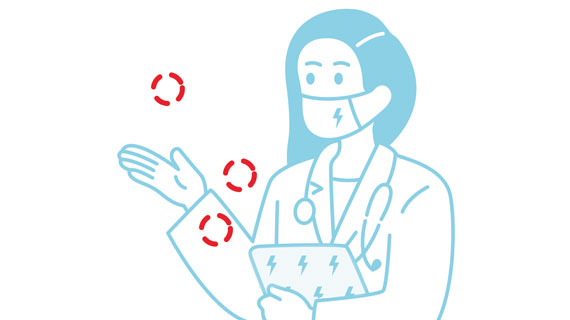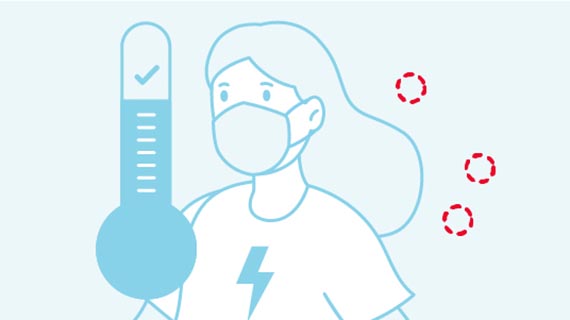COVID-19 Vaccination Facts and Frequently Asked Questions
Posted: September 21, 2021 | Author: Southern Utah University | Read Time: 7 minutes
 As you prepare for and attend classes this fall semester, consider getting the COVID-19 vaccination. Being vaccinated can significantly reduce the need to quarantine and isolate, and therefore, cause less disruption to your work and/or school presence and participation.
As you prepare for and attend classes this fall semester, consider getting the COVID-19 vaccination. Being vaccinated can significantly reduce the need to quarantine and isolate, and therefore, cause less disruption to your work and/or school presence and participation.
Facts About the COVID-19 Vaccine in Utah
According to the coronavirus.utah.gov website, between the months of May and July 2021, Utah saw:
- 15,949 total COVID-19 cases, 93.4% (14,900 cases) were unvaccinated
- 1,049 people hospitalized, 91.3% (958 people) were unvaccinated
- 77 deaths, 96% (74 deaths) were unvaccinated
Top Questions About the COVID-19 Vaccine
If you are still deciding whether or not the COVID-19 vaccination is the right choice for you, learn more about the vaccination with the following frequently asked questions from the State of Utah’s COVID-19 response website:
Are the vaccines safe and effective even though they were developed quickly?
Yes. Millions of people in the United States have received COVID-19 vaccines under the most intense safety monitoring in history. The FDA, CDC, and Advisory Committee on Immunization Practices (ACIP) have carefully reviewed all available data and are confident the vaccines are safe and effective to prevent COVID-19.
Learn more at coronavirus.utah.gov/vaccine-facts.
Are the vaccines effective?
Yes. Data from both the clinical trials and real-world studies show the COVID-19 vaccines are incredibly effective at preventing sickness, hospitalization, and death. Recent studies show the vaccines work against the new variants of the virus identified so far and prevent transmission of the virus to other people. Research also shows the vaccines help avoid long-term effects of COVID-19 and may actually improve things for those who are suffering from long-term effects of COVID-19. Studies show the vaccines likely provide longer lasting immunity compared to natural immunity (immunity from having the disease). Vaccination strengthens your immune response and is a safer way to build immunity than getting the disease again. COVID-19 can have serious long-term health effects that doctors are still learning about.
Data from each of the clinical trials can be found here: Pfizer/BioNTech, Moderna, and Johnson & Johnson/Janssen.
Learn more at coronavirus.utah.gov/vaccine-facts.
Do the COVID-19 vaccines change your DNA?
No. COVID-19 vaccines (Pfizer and Moderna) are mRNA vaccines and don’t interact with your DNA in any way. The vaccines don’t have any live virus in them and can’t give you COVID. Messenger RNA, or mRNA, is genetic material that tells your body how to make proteins. These types of vaccines teach your body how to make copies of the spike protein found on the coronavirus. This triggers an immune response that creates antibodies to protect you from getting infected with COVID-19.
Learn more at coronavirus.utah.gov/vaccine-facts.
Will I experience long term side effects from the vaccine?
It’s very unlikely. While it’s true we don’t have years of data on the COVID-19 vaccines, we do have hundreds of years of knowledge about the human body and vaccinations. Plus—because COVID-19 affected millions of people around the world at the same time—scientists got to study the effects of the vaccine on hundreds of thousands of people with different backgrounds and different levels of health—we got data that normally would have taken years to get. If you look at the history of all vaccinations, almost every long-term side effect from vaccination shows up between 6-8 weeks after vaccine clinical trials end. That’s why the FDA requires a wait time of at least 60 days after the end of a clinical trial before an emergency use authorization (EUA) can be given.
Mild or moderate symptoms after getting vaccinated are normal and may last a few days, like a fever, muscle aches, headaches, feeling tired, or redness around the injection site. This is common after any vaccine, and means your body has started creating an immune response and is learning to fight the disease. Severe side effects and allergic reactions are rare. Your chance of having a life-threatening case of COVID-19 is much higher than your potential risk of ever getting a serious side effect from the vaccine.
Learn more at coronavirus.utah.gov/vaccine-facts.
Do I need the vaccine if I’ve already had COVID-19?
Yes. You should still get vaccinated, even if you’ve already had COVID-19. Even if you still have some natural immunity, or immunity from having the virus, studies are showing the immunity from the vaccines adds another layer of protection, better protects against variants, keeps you from even getting the virus again, and lasts longer than natural immunity. Vaccination is a much safer and effective way to develop immunity than being infected by the virus because you don’t know how COVID-19 will affect you.
We have enough supply of vaccine for everyone. When the vaccines first became available, supplies were low and many states recommended waiting 90 days to get vaccinated after you’d had COVID-19, so we could make sure we had enough for those who were most at risk. This was the best recommendation at the time. We don’t have to do that anymore. You DO NOT need to wait 90 days after having COVID-19 to get vaccinated. You can get vaccinated as soon as you are no longer in isolation and you don’t have any symptoms.
Learn more at coronavirus.utah.gov/vaccine-facts.
What are the side effects of COVID-19 vaccines?
It is common for people to have mild or moderate symptoms or side effects after they get a vaccination. There is usually no reason to worry if you get mild to moderate symptoms a few days after getting vaccinated. This means your body has started working to create an immune response and is learning to fight the disease. Mild or moderate symptoms include things like a fever or redness around an injection site.
Common side effects include pain, redness, and swelling at the site of the injection. You may also notice tiredness, headache, muscle pain, chills, fever and nausea.
Side effects after your second shot may be more intense than the ones you experienced after your first shot. These side effects are normal signs that your body is building protection and should go away within a few days.
Vaccination Clinics at SUU
To help the University community get vaccinated and protect one another, SUU is hosting vaccination clinics for students, faculty, and staff. Campus vaccination clinics will be held on the following dates.
Student Vaccination Clinics
SUU’s Health and Wellness Center and the Southwest Public Health Department will be providing three clinics for students to receive the COVID-19 vaccine. Please bring your ID to all clinics.
- October 26, 2021 from 8:30 a.m. to 11:30 a.m. in the Cedar Breaks Room
- November 9, 2021 from 8:30 a.m. to 11:30 a.m. in the Cedar Breaks Room
- December 7, 2021 from 8:30 a.m. to 11:30 a.m. in the Cedar Breaks Room
Additionally, the flu shot will also be available at the October 26 clinic. For students that would like to receive the flu shot as well, please bring your insurance card if possible. Students without insurance are still welcome to receive the flu shot, but will have to pay out of pocket.
Faculty and Staff Vaccination Clinics
SUU’s Human Resource Department and the Southwest Public Health Department will be providing two clinics on campus for faculty and staff to receive the COVID-19 vaccine. To be vaccinated at these clinics, employees must sign up to receive both shots.
Employees are welcome to bring spouses or adult children, but not minor children. The two clinics will only be offering the Moderna vaccine and it is not approved for people under 18.
You will need to bring your photo ID, insurance card, and the signed consent form. Please book an appointment to save your spot.
- September 20, 2021 from 11 a.m. to 1 p.m. in the Escalante Room
- September 21, 2021 from 11 a.m. to 1 p.m. in the Escalante Room
- October 18, 2021 from 10 a.m. to 12 p.m. in the Escalante Room
- October 19, 2021 from 10 a.m. to 12 p.m. in the Escalante Room
COVID-19 Guidelines for Fall 2021
As a reminder, SUU encourages students, faculty and staff to complete the following:
- Get vaccinated: Learn more about vaccine safety from the CDC. Vaccination can reduce or eliminate the need to quarantine or isolate. It also can help better protect not only you, but other campus community members.
- Wear a mask: SUU is a mask-recommended campus. The University strongly recommends that students, faculty, staff, and visitors wear masks inside campus buildings and when you can't social distance.
- If you are sick, please stay home and follow appropriate protocols: Your professors and supervisors will be flexible and work with you to make accommodations.
- Get tested: If you have symptoms known to be associated with COVID-19, please get tested and stay away from other people to the greatest extent possible (including taking leave from work when needed) at least until you receive a negative test result. If you have symptoms of any communicable sickness even after a negative test result, please stay away from campus.
- Get informed: Check this website often and follow the recommendations of the State of Utah and local public health department.
SUU continues to monitor the situation and will follow all state and local requirements and standards. Updates on the COVID-19 response and guidelines for the campus community can be found at suu.edu/coronavirus.
This article was published more than 3 years ago and might contain outdated information or broken links. As a result, its accuracy cannot be guaranteed.



